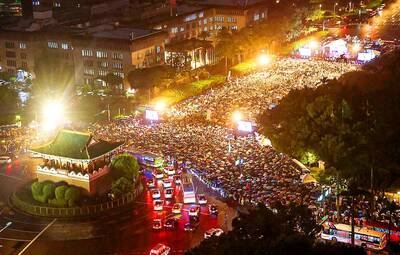Department of Health (DOH) Minister Yaung Chih-liang (楊志良) said yesterday the country does not intend to follow advice by the WHO on measures that can be adopted in schools to reduce the impact of influenza A(H1N1).
Yaung said the DOH’s class suspension measures in high schools and elementary schools have worked well so far, adding that the department would use the WHO advice as a reference.
Under the Ministry of Education’s “325” policy for class suspensions, classes in high schools and elementary schools will be closed for five days if at least two students in the class are diagnosed with A(H1N1) within a three-day period.
Citing modeling studies, however, the WHO said that school closures were most beneficial when schools were closed very early in an outbreak, ideally before 1 percent of the population falls ill.
Under ideal conditions, school closures can reduce the demand for healthcare by an estimated 30 percent to 50 percent at the peak of an epidemic, says the WHO, which suggests that if schools close too late in the course of a community-wide outbreak, the resulting reduction in transmissions is likely to be very limited.
In related developments, the Central Epidemic Command Center (CECC) reported that the number of patients hospitalized with severe cases of influenza A(H1N1) had increased to 203 as of yesterday, adding that 17 of the cases were admitted on the previous day alone.
It marked the highest daily number of H1N1 hospital admissions in Taiwan, CECC officials said.
The 17 new patients included eight females and nine males, the officials said.
The figure also included an 83-year-old man who died on Wednesday of pneumonia and was later discovered to also have been infected with A(H1N1). Officials said the man, who was the country’s 12th H1N1 fatality, had also been suffering from a host of underlying diseases including tuberculosis, spontaneous pulmonary fibrosis and cancer of the tongue.
The latest CECC statistics showed that 58 patients remained hospitalized, while 133 have been discharged after recovering.
Meanwhile, 302 classes in 207 high schools and elementary schools around Taiwan remained suspended because of A(H1N1) infections among students, accounting for 0.2 percent of all classes, the officials said.
The suspension of the classes was helping to stem the spread of the disease, they said.
Meanwhile, Centers for Disease Control director-general Steve Kuo (郭旭崧) said the CDC had urged local hospitals and clinics to refuse healthy individuals’ requests for swine flu screenings.
“If the person does not have any flu symptoms, a doctor is not allowed to carry out a screening test on the person,” Kuo said. “This is a waste of medical resources and doctors definitely have the right to decline such a request.”
ADDITIONAL REPORTING BY JIMMY CHUANG

The Central Weather Administration (CWA) today issued a "tsunami watch" alert after a magnitude 8.7 earthquake struck off the Kamchatka Peninsula in northeastern Russia earlier in the morning. The quake struck off the east coast of the Kamchatka Peninsula at 7:25am (Taiwan time) at a depth of about 19km, the CWA said, citing figures from the Pacific Tsunami Warning Center. The CWA's Seismological Center said preliminary assessments indicate that a tsunami could reach Taiwan's coastal areas by 1:18pm today. The CWA urged residents along the coast to stay alert and take necessary precautions as waves as high as 1m could hit the southeastern

FINAL COUNTDOWN: About 50,000 attended a pro-recall rally yesterday, while the KMT and the TPP plan to rally against the recall votes today Democracy activists, together with arts and education representatives, yesterday organized a motorcade, while thousands gathered on Ketagalan Boulevard in Taipei in the evening in support of tomorrow’s recall votes. Recall votes for 24 Chinese Nationalist Party (KMT) lawmakers and suspended Hsinchu City mayor Ann Kao (高虹安) are to be held tomorrow, while recall votes for seven other KMT lawmakers are scheduled for Aug. 23. The afternoon motorcade was led by the Spring Breeze Culture and Arts Foundation, the Tyzen Hsiao Foundation and the Friends of Lee Teng-hui Association, and was joined by delegates from the Taiwan Statebuilding Party and the Taiwan Solidarity

Instead of threatening tariffs on Taiwan-made chips, the US should try to reinforce cooperation with Taiwan on semiconductor development to take on challenges from the People’s Republic of China (PRC), a Taiwanese think tank said. The administration of US President Donald Trump has threatened to impose across-the-board import duties of 32 percent on Taiwan-made goods and levy a separate tariff on semiconductors, which Taiwan is hoping to avoid. The Research Institute for Democracy, Society, and Emerging Technology (DSET), a National Science and Technology Council think tank, said that US efforts should focus on containing China’s semiconductor rise rather than impairing Taiwan. “Without

The National Museum of Taiwan Literature is next month to hold an exhibition in Osaka, Japan, showcasing the rich and unique history of Taiwanese folklore and literature. The exhibition, which is to run from Aug. 10 to Aug. 20 at the city’s Central Public Hall, is part of the “We Taiwan” at Expo 2025 series, highlighting Taiwan’s cultural ties with the international community, National Museum of Taiwan Literature director Chen Ying-fang (陳瑩芳) said. Folklore and literature, among Taiwan’s richest cultural heritages, naturally deserve a central place in the global dialogue, Chen said. Taiwan’s folklore would be immediately apparent at the entrance of the